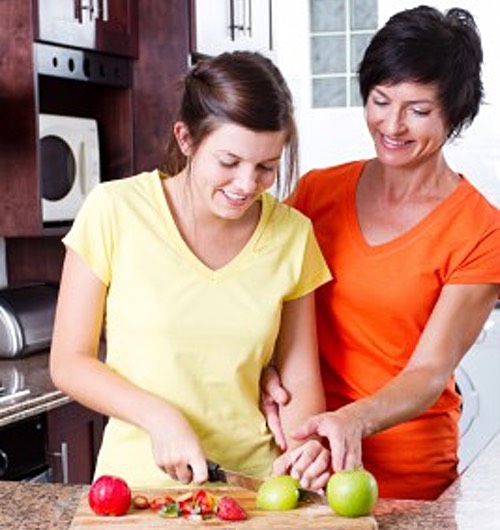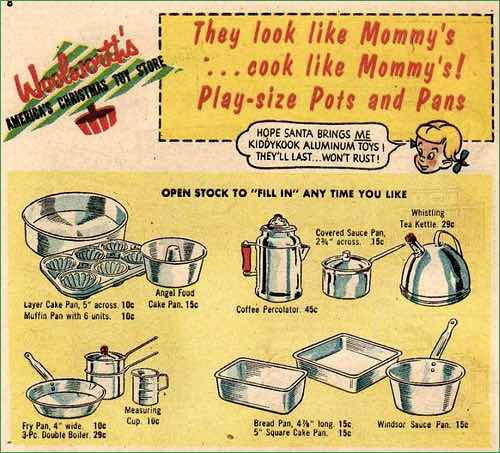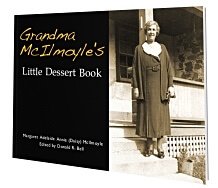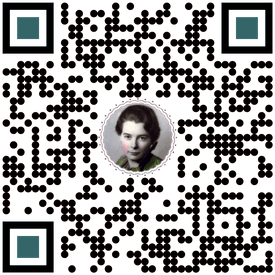- Home
- Recipe Help & Misc
- Secret Cooking Tips
Secret Cooking Tips
Grandma's secret cooking tips often helped her in the kitchen. She gleaned them from popular cookbooks and almanacs, and some tips had been passed down from her mother. You are sure to find them useful in your own kitchen.
Grandma's Secret Cooking Tips
Young's Demonstrative Translation of Scientific Secrets (1861)
Buckeye Cookery and Practical Housekeeping (1877)
The Perry Home Cook Book (1920)
The White House Cook Book (1913)
Mom's Recipe Scrapbooks (1920s)
 Mother Sharing Her Secret Cooking Tips
Mother Sharing Her Secret Cooking Tips(Source: ©hongqi-zhang/123RF.com)
Slicing Pineapples
The knife used for peeling a pineapple should not be used for slicing it, as the rind contains an acid that is apt to cause a swollen mouth and sore lips. The Cubans use salt as an antidote for the ill effects of the peel.
To Sweeten Milk
Milk which is slightly turned sour or changed may be sweetened and rendered fit for use again by stirring in a little baking soda.
To Scald Milk
Grandma's secret cooking tip for whenever a recipe calls for scalded milk.
Put milk in top of double boiler, having water boiling in under part. Cover, and let stand on top of range until milk around edge of double boiler has a bead-like appearance.
To Prevent Milk Curdling
 Fond Memories — 1953 Toy Pots and Pans Kitchen Set
Fond Memories — 1953 Toy Pots and Pans Kitchen Set(PD Source: Dell Comics, 1953)
A pinch of baking soda stirred into milk that is to be boiled will prevent curdling.
To Preserve Milk
A spoonful of grated horseradish will keep a pan of milk sweet for days.
To Keep Milk Sweet
Milk will keep sweet longer in a shallow pan than in a pitcher.
Cream Substitute For Emergencies
A good substitute for cream can be made with fresh milk, a little butter and flour.
To Test Nutmegs
Prick them with a pin; if good, the oil will instantly spread around the puncture.
Grating Nutmegs
Always grate nutmegs at the blossom end first.
To Caramelize Sugar
Put sugar in a smooth granite saucepan or omelet pan, place over hot part of range, and stir constantly until melted and of the color of maple syrup. Care must be taken to prevent sugar from adhering to sides of pan or spoon.
To Make Caramel
Continue the caramelizing of sugar (see above) until syrup is quite brown and a whitish smoke arises from it. Add an equal quantity of boiling water, and simmer until of the consistency of a thick syrup. Of use in coloring soups, sauces, etc.
To Blanch Almonds
Grandma's secret cooking tip makes the task of skinning almonds easy.
Cover Jordan almonds with boiling water and let stand two minutes; drain, put into cold water, and rub off the skins. Dry between towels.
To Shred Almonds
Cut blanched almonds in thin strips lengthwise of the nut.
To Make Macaroon Dust or Flour
Dry macaroons, pound and sift.
To Shell Chestnuts Easily
Cut a half-inch gash on flat sides and put in an omelet pan, allowing one-half teaspoon butter to each cup chestnuts. Shake over range until butter is melted. Put in oven and let stand five minutes. Remove from oven, and with a small knife take off shells.
By this method shelling and blanching is accomplished at the same time, as skins adhere to shells.
To Add Flavoring Extracts and Wine
They should be added if possible to a mixture when cold. If added while mixture is hot, much of the goodness passes off with the steam.
To Prevent Salt From Lumping
Mix with cornstarch, allowing one teaspoon cornstarch to six teaspoons salt.
After Broiling or Frying
If any fat has spattered on range, wipe surface at once with newspaper.
Using Bread Crumbs For Pastry
Use Grandma's secret cooking tip to make a last minute, tasty homemade dessert.
Many puddings that are commonly baked in a crust, such as coconut, potato, apple, and lemon are equally good and more wholesome, made by strewing grated bread crumbs over a buttered pie plate or pudding dish to the usual depth of crust; pour in the pudding filling, strew another layer of bread crumbs over the top, and bake.
Storing Coffee
Keep coffee by itself, as its odor affects other articles.
To Keep Oranges and Lemons
They keep best wrapped in soft paper, and, if possible, laid in a wooden drawer.
To Keep Apples
They keep best in a dry place, as cool as possible without freezing.
When Baking Pies, Cakes, Cookies, Etc.
Grandma often used this secret cooking tip when baking.
A bowl containing two quarts of water, set in an oven when baking, will prevent pies, cakes, cookies, etc., from being scorched in a hot oven.
To Store Flour
Keep flour cool, dry, and securely covered.
Gathering Herbs
Gather herbs when beginning to blossom; keep in paper bags.
Cake Icing Tip
A tiny pinch of baking soda in your icing will keep it moist and prevent its cracking on the cake.
To Prevent Pots from Boiling Over
Of all Grandma's secret cooking tips, remember this one. It is so practical, and it really works!
Rub butter or lard on the rim of a pot, and it won't boil over readily. Be sure to remember this secret cooking tip when boiling liquids such as when making candy or spaghetti.
To Cure Salty Soup
A raw potato added to the soup will absorb the extra salt.
Oatmeal In Baking
One-third cup of dry oatmeal in buckwheat cakes takes away the raw taste and makes cakes flaky.
To Dry Herbs
Dry the gathered crop, thinly spread out and shaded from the sun, tie the herbs in small bundles, and keep them compactly pressed down and covered with white paper; or, after drying them, put each sort into a small box, and by means of boards fitted in it, and a screw-press, press the herbs into cakes or little trusses.
These should be afterwards carefully wrapped up in paper and be kept in a dry place, when they will retain their aroma as perfectly as when they were put into the press, for at least three years. By the common method of hanging up herbs in loose bundles the odor soon escapes.
To Prevent a Tough Omelet
A little boiling water added to an omelet as it thickens will prevent it being tough.
To Cut Hard-Boiled Eggs
This secret cooking tip sounds almost too simple, but it works!
To cut hard-boiled eggs in smooth slices, dip the knife first in water.
To Prevent Heavy Cake and Breads
Much of the heavy cake and bread is the result of the oven door being slammed. Close as gently as possible.
To Cut Potatoes
An empty tin can edge makes a good cutter for slaw or potatoes.
To Make Fowl Tender
A little vinegar in the water will help make tender an old fowl when cooking.
To Keep Egg Yolks Centered
Store your eggs with the large end up to keep the air pocket in the large end and the yolk in the center.
To Keep Bread Sweet
A pinch of ginger in the mix will keep bread sweet.
To Beat White of Egg Quicker
A pinch of salt will make the white of an egg beaten quicker.
To Prevent Scorching In Oven
Salt placed under baking tins in oven will prevent contents from scorching.
To Remove Cake From Pan
If cake sticks to the pan, set on a wet cloth 5 minutes and cake can be removed.
To Remove Odor From Oven
If juice from pies runs out in oven, salt sprinkled on juice will remove the odor and smoke.
To Peel Oranges Easily
Grandma's secret cooking tip for peeling oranges can be used with modern microwave ovens, but only heat the orange for a VERY FEW seconds, or it will explode.
Heat oranges a few minutes in oven before peeling, then the white inner skin will come off with the rind.
To Make Tough Meat Tender
Lay it a few minutes in a strong vinegar water.
Salt Will Curdle Milk
Hence, in preparing porridge, gravies, sauces, etc., the salt should not be added until the dish is prepared.
To Keep Fresh Meat
Never allow fresh meat to remain wrapped in paper; it absorbs the juices.
To Prevent Odor of Boiling Ham or Cabbage
Throw red pepper pods or a few bits of charcoal into the pan they are cooking in.
To Prevent Mold on the Top of Glasses of Jelly
Just lay a lump of paraffin wax on the top of the hot jelly, letting it melt and spread over it. If preferred, the paraffin can be melted and poured over after the jelly is cold.
To Prevent Burning Saucepan
To prevent burning saucepan when boiling milk, sprinkle bottom of the pan with a little granulated sugar. Let it get hot, then pour in the milk. It also keeps milk from boiling over.
To Keep Syrup From Crystallizing
A pinch of baking soda added to any boiled syrup will keep it from crystallizing.
When Squeezing Lemons For Juice
Heat lemons well before squeezing and there will be double the quantity of juice.
To Keep Salt From Sticking
You'll find this secret cooking tip most useful. It's a practical tip that's often used by restaurants.
A few grains of rice placed in the bottom of a salt cellar will keep salt from sticking in damp weather.
To Cook Cranberries
Add one-quarter teaspoon baking soda to cranberries while cooking and they will not require much sugar.
When Baking Fruit Pies
Grandma's secret cooking tip that she used when baking pies with fruit fillings.
To keep juice from running out of fruit pies, insert a small cornucopia (cone) of white note paper into the center of the pie so that it is about twice the height of the pie.
To Separate Eggs
When separating eggs, if you drop a portion of egg yolk into the whites, moisten a cloth with cold water, touch to the yolk, and it will adhere to it.
To Make Fancy-Shaped Sandwiches
Cut bread for fancy sandwiches lengthwise instead of across the loaf and there is less waste.
After Freezing Homemade Ice Cream
Empty remaining cracked ice into sack; ice will melt, leaving the salt which can be used again.
To Secure Serving Dishes On Ice
Place rubber ring from fruit jar under dishes. Ring will adhere to both ice and dish.
Preventing Custard Pie Shrinking
Practice this secret cooking tip and you'll always bake good custard pies like Grandma's.
When a custard pie shrinks from the crust, it has been baked in too hot an oven. The oven should be hot for the first eight or ten minutes, in order to bake the pastry so that it will not become soaked with liquid. Then reduce the heat or the custard will boil.
Testing Eggs For Freshness
If an egg is strictly fresh it will, when placed in a pot of water, lie on its side at the bottom of the pan. If stale, it will stand on end, and if very old, it will rise to the surface.
To Remove Cooking Odors From Hands
Wash hands and before drying them rub on about 1 teaspoon of dry mustard powder.
When Baking Apples
Prick the skin of the apples with a pin and they will cook without bursting.
To Remove Cooking Odor From Kitchen
Should food become burnt while in the process of cooking, sprinkle a tiny pinch of coffee grains over the hot stove or element. The fragrance of the burning coffee will kill the burning smell.
Cooking Pancakes
Dip the spoon in milk or water and the pancake batter will drop off the spoon easily.
To Slice Potatoes
First hold the paring knife over a hot stove or in boiling water and the potatoes will slice easily.
Beating Egg Whites
Never beat eggs in an aluminum pan, as it is sure to darken them.
Cake Icing Tip
A TINY pinch of salt will stop icing from going sugary.
Butter Icing Tip
Add 3/4 tablespoon of flour in butter icing to prevent it melting.
Warning
Use Grandma's secret cooking tips with caution and common sense, and always AT YOUR OWN RISK. The use of modern ingredients and cooking methods may produce different results. Some tips might be outdated and are simply entertaining.

Sign Up now for GRANDMA'S DESSERT CLUB and download your FREE PDF COPY of Grandma McIlmoyle's Little Dessert Book. Also receive my regular Bulletin featuring classic recipes and nostalgia.











